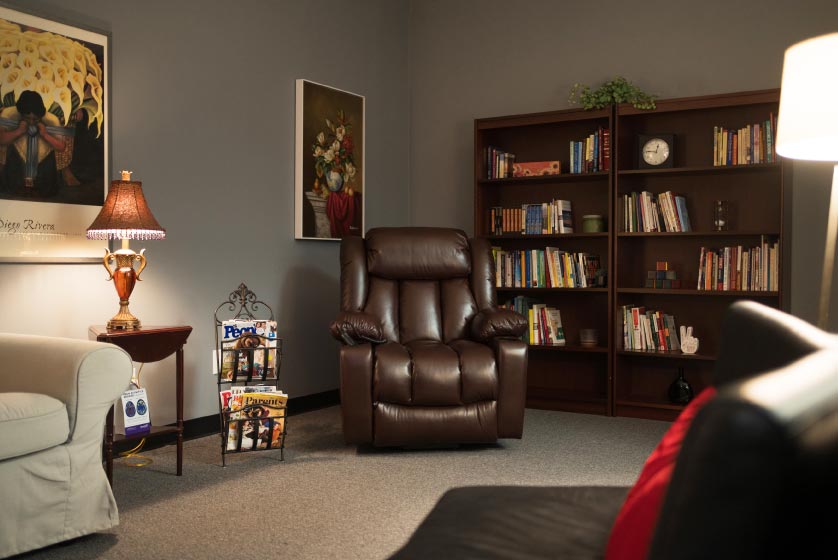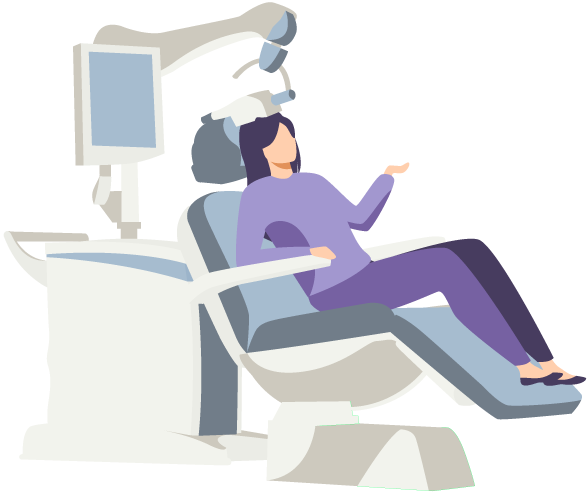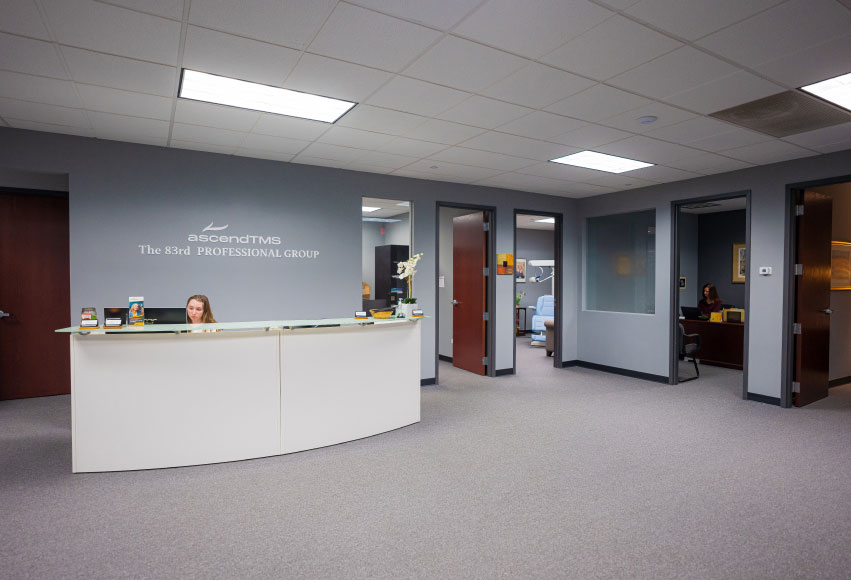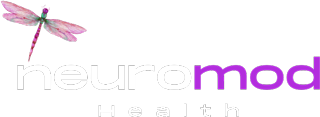We Accept Insurance






Start your journey with NeuroMod Health
Depression, OCD, and other mental illnesses interfere with the way we want to live our lives. Medications sometimes render partial relief, and can cause unpleasant side effects.
Transcranial Magnetic Stimulation (TMS Therapy) and Spravato (Esketamine ) are revolutionary FDA-approved, non-invasive alternative options that can replace or augment your current psychiatric treatment. Join the millions nationwide who are now waking up again to the beauty of life.

Why NeuroMod Health?
At NeuroMod Health, we work to provide hope where other options have failed and we help you reach your full potential. We will go the extra mile to build a customized treatment plan with board certified psychiatrists on site and support staff that closely monitor your progress.

Become YOU again
We strive to help you live a life free of depression, reach a state of emotional regulation, and help you build resilience for life’s journey.

For all your needs
We offer various resources and referrals including individual and family counseling, medication management and weight management to meet your needs.

Led by experts
Our psychiatrists and healthcare partners lead evidence based treatments that are current, safe and effective.

However you are affected
Whether you are diagnosed yourself or have a family member suffering from depression, we provide free consultations to assess your needs and provide the right level of support.

Covered By Insurance
Medicare and other commercial insurances cover TMS treatments. We provide benefit investigations and prior authorizations to ensure optimal coverage before you start your treatment.

Over 1 million treatments performed
TMS is an increasingly sought after alternative treatment for depression, OCD and many other mental health conditions, with rapidly growing indications.
More About TMS Therapy
Transcranial magnetic stimulation (TMS) targets key areas of the brain that are underactive in people with depression. It is not ECT (electroconvulsive therapy). While the exact cause of depression is not known, the leading scientific theory is that it is caused by an imbalance of the brain’s neurotransmitters, which are chemical messengers that send signals between brain cells.
Contact us to learn more about the mechanism of action behind TMS therapy.
Or Call 630-850-0604

What to expect?
Before treatment, you’ll recline comfortably in the treatment chair. During in-office treatment, the coil will be placed on the specific treatment location determined during the motor threshold assessment. Then, during treatment focused magnetic stimulation is provided directly to the target areas of the brain. You’ll hear a clicking sound and feel a tapping sensation on your head.
Each treatment will last between 3 and 37.5 minutes depending on the clinical protocol prescribed by your physician.
The People Who Care About Your Recovery
Clinical Depression Treatment
Our team of psychiatrists and coordinators at NeuroMod Health strives to build long-term and trust-filled relationships with our patients. We are committed to diversity, respect, and honoring each patient as a valued individual. Our mission is to lead as a physician-based mental health treatment facility that best serves and advocates for our community.
You, as our patient, take center stage in our team-based approach, and you’ll benefit from the contributions of all our staff through their mission of providing excellent medical care and empathetic service

Patient testimonials
This is what other people, just like you, had to say after undergoing their NeuroMod Health journey.
Meagan C
I was extremely happy with NeuroMod Health.
I worked with Melissa and Fiona primarily, and they were both wonderful, from getting insurance approval, to making TMS treatments possible with a very busy schedule.
I saw a drastic decrease in my depressive symptoms, and would absolutely recommend Ascend to anyone struggling.
Farida Hassan
The team at NeuroMod Health are extremely welcoming and provide a very warm and comforting atmosphere.
The facility is very clean and provides a very relaxing environment. All the staff were extremely supportive, kind and positive from the very first day.
Dr Shabbir, Dania and Melissa demonstrate great care and a very person-centered and thoughtful approach for every patient.
I can clearly tell that they all prioritize patient comfort and satisfaction and always go above and beyond to ensure that. I couldn’t be happier with the great and hospitable environment and staff members!
Jillian Acevedo
I had a great experience at NeuroMod Health! Everyone was so kind and caring from day one. Dr Shabbir has such great bedside manner.
She took her time and made sure she answered all my questions and even checked in from time to time to make sure I was doing ok. Melissa was so thoughtful and amazing.
She always went above and beyond to make my experience a great one and always did it with a smile. Dania did my last treatment and was so great and mirrored the same kindness and thoughtfulness I had experienced with Melissa.
I couldn’t be more happy with the staff and my treatments.
Anonymous
Are you suffering from depression or anxiety that makes you feel hopeless and helpless and all alone?
I highly recommend NeuroMod TMS for anyone suffering from depression and/or anxiety. I was not recommended by my doctor, but I researched the procedure and decided to try it on my own. I could not be more pleased with my decision!
I had to gather my courage to walk into that lovely, peaceful office for the first time in order to get information. I wasn’t yet sure of the details, or whether I would actually go through with TMS.
When I walked in, I was warmly greeted by Melissa Neyfeldt, whose warm welcome and calm demeanor immediately put me at ease.
She was there to answer my questions and verified that my insurance would pay for the entire series of treatments. Never once was I pressured or felt uncomfortable.
She then showed me the treatment room, where you sit in a chair similar to a dentist chair, and lean back and relax.
I was very happy to know that each treatment would only last 3 1/2 minutes! Who doesn’t have 3 1/2 minutes a day to change your life?
If you decide to go forward, as I did that very first day, you get one treatment five days per week. I chose a time that was convenient for me to come every Monday through Friday. Should something come up, the staff is more than willing to accommodate you and change the time of your appointment.
Please don’t be hesitant about coming Monday through Friday. Because I stuck to a set schedule, it was just a normal part of my day. Driving to the treatment each weekday was a very small price to pay for state-of-the-art treatment for depression that NeuroMod provides. Combine that with the first rate doctors, coordinator, technician, therapist, and staff who devote their time and attention to just you whenever you are there. And due to the warm reception I received from the ever-cheerful and knowledgeable Melissa and Daniella, the TMS coordinators, who handle all paperwork and insurance, (Yes! You read that correctly! I never had to fill out any insurance paperwork or call my insurance company!) and Eshah, the truly empathetic TMS technician, I looked forward to my appointments. I will never forget Eshah’s sincere caring, always making sure I was comfortable before beginning my session, and her wise suggestions on how to implement my treatments with things to do at home. Because of all of the positivity I was given each day, I actually missed coming on the weekends.
The tranquil and calming atmosphere, and privacy, made me feel 100% comfortable. I was always greeted with a smile, encouraging words, and praise. The staff made me feel valued and cared about. Both Daniella and Eshah showed an abundance of compassion and thoughtfulness. And when I was feeling down, Eshah, Daniella, and Melissa we’re always there to lift me up. Before and after my 3 1/2 minute session, they always checked in with me to see how I was doing, how did I feel the day before, did I get a good nights sleep, etc.
Dr Shabbir met with me several times over the course of my treatment. She was extremely kind, caring, and professional. She thoroughly familiarized herself with what medication I was taking. It really did matter to her how I was doing.
The therapist Annette Oachs is warm, kind, and an excellent listener who soon feels like a friend.
The entire staff at NeuroMod now feels like a family to me.
So, basically, there is no downside to coming, and you will receive a reason to feel hope and live your best life again!
The Help that you were Looking for

FAQ
Transcranial magnetic stimulation, often referred to as TMS is a noninvasive procedure that uses magnetic fields to stimulate nerve cells in the brain to improve symptoms of depression. TMS is typically used when antidepressant medications haven’t been effective, have ceased working, or as an alternative to medication
TMS therapy works by sending magnetic pulses to specific areas of the brain that are associated with depression. The pulses stimulate nerve cells in these areas, which can help improve mood and reduce symptoms of depression.
TMS therapy is generally considered safe, but it can have side effects such as headaches, scalp discomfort, and muscle twitching. These side effects are usually mild and go away shortly after treatment.
TMS does not circulate in the blood throughout the body, so it does not have side effects like weight gain, sexual dysfunction, nausea, dry mouth, sedation, etc. The most common side effects reported during clinical trials were headache and scalp discomfort — generally mild to moderate — occurring less frequently after the first week of treatment
TMS therapy is not painful, but some people may experience mild discomfort or a sensation of tapping or knocking on the scalp during treatment.
A typical course of TMS therapy involves daily treatments for four to six weeks. Each treatment session lasts about 20-40 minutes.
A vast majority of commercial and Medicare plans have recognized the effectiveness of treating depression with TMS Therapy and now cover TMS as part of their plans.


